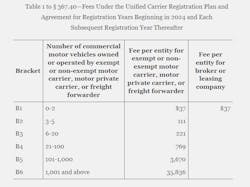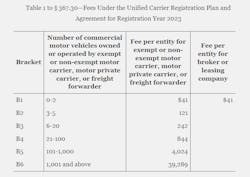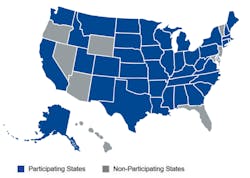FMCSA proposes lower UCR fees for 2024—but expects 2025 hike
The Federal Motor Carrier Safety Administration is proposing to decrease fees for the Unified Carrier Registration (UCR) Plan for 2024, meaning carriers, brokers, freight forwarders, and leasing companies would pay less for their annual registrations. However, the UCR Plan Board anticipates a hike in fees for 2025, following what it calls “large fee decreases” in previous years, according to a Federal Register filing.
The fees—which every year are collected and distributed to 41 participating states for roadside safety programs—would be reduced below the fees for 2023 by about 9% overall, with varying reductions between $4 and $3,453, depending on the number of trucks a carrier runs.
See also: FMCSA reopens broker definition rulemaking for MATS listening session
The UCR Act, established in 2005 and first enacted in 2007, requires fee reductions when registration revenues collected in previous years exceed the maximum annual revenue of $107.78 million distributed among the 41 states, plus administrative costs of $4.25 million.
FMCSA had already reduced UCR fees for 2023 by about 30% after overcollection in 2022. The fee has been both reduced and increased since its enactment, scaled according to the overall amount collected.
The UCR Plan Board also has modified its methodology for calculating recommended fees. In past years, they were based on minimum collections, which consistently resulted in an underestimation of collection. The board now uses an average of the historical collections over the prior three years to determine projected collections, which it says will yield a more accurate result.
UCR: Unfair and contentious—or reasonable?
According to Lewie Pugh, EVP of Owner-Operator Independent Drivers Association (OOIDA), UCR has over-collected fees to the tune of $42 million, which Pugh said should not be saved away but passed back to the industry via lower fees.
“They set up some rainy-day funds over at UCR, and we don’t think that they’re supposed to do that,” Pugh said. “They’re supposed to collect X amount of dollars, and anything over that is supposed to be returned to the truckers [via lower fees].” Pugh said that the consistent lowering of fees shows that UCR continuously over-collects, indicating the program’s inefficiency.
Via email to FleetOwner, UCR Executive Director Avelino Gutierrez responded to OOIDA’s assertion, saying fund allocations have been legitimate, and “the UCR Board and FMCSA have approved the methodology for excess fee revenue allocations.”
Monte Wiederhold, a UCR board member and current OOIDA board member, said that although the UCR Plan held excess funds, this money was likely under $30 million. Monte represents the interests of smaller fleets on UCR's board and said his opinions do not represent the 15-member board but only his as president of B.L Reever Transport.
Wiederhold said enforcement has been challenging, with some owner-operators and carriers not realizing their obligation to pay the UCR fee. “I guarantee if you went to a truck stop and asked anybody with their own authority, anybody with five years or less, ‘Hey, what’s UCR?’ … They wouldn’t have a clue,” he said.
He added: “How do we catch these guys who don’t know they’re responsible for [the fees]? You’re trying to hold people accountable for stuff they don’t know about.”
FMCSA, however, has stated that it has accounted for noncompliance. Recognizing that 100% compliance is impossible, UCR’s fee structure was based on a compliance rate of 86.42%, according to the 2010 final rule.
Because of the tiered pricing, Pugh also asserts that the plan is biased against smaller carriers and owner-operators, effectively making carriers with fewer trucks pay more per vehicle. “It should be the same amount, whether you’re in one power unit or 10,000 power units. Why should you get a discount?”
Wiederhold said there are yet more equitable ways to split UCR fees across fleets of all sizes. “If each state raised their fuel tax one penny per gallon, it would give them more money than what they’re currently getting under the plan, and there’s no cheating.”
About the Author
Scott Keith
Scott Keith is a former fleet owner digital editor, who was on staff from 2022 to 2023.




